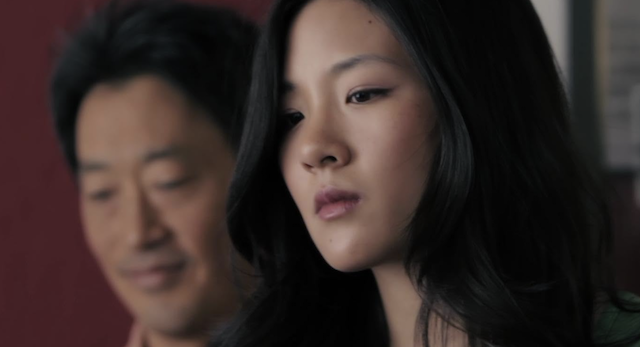
©Courtesy of Level 33 Entertainment
East Bay : An unexpectedly uplifting comedy about 39-year-old Jack Lee, who is forced to accept that he’s a failure. He turns to his friends, whose lives also haven’t exactly gone as planned. Each struggle with the constant pressure to be happy and successful. As Jack tries to get back on track, he has hallucinations that make him question reality.
Director : Daniel Yoon
Producer : Daniel Yoon
Screenwriter : Daniel Yoon
Distributor : Level 33 Entertainment
Genre : Comedy, Drama, Romance, Sci-Fi, Fantasy
Original Language : English
Release Date (Theaters) : May 10, 2024, Limited
Release Date : (Streaming)May 31, 2024
Runtime : 1h 34m
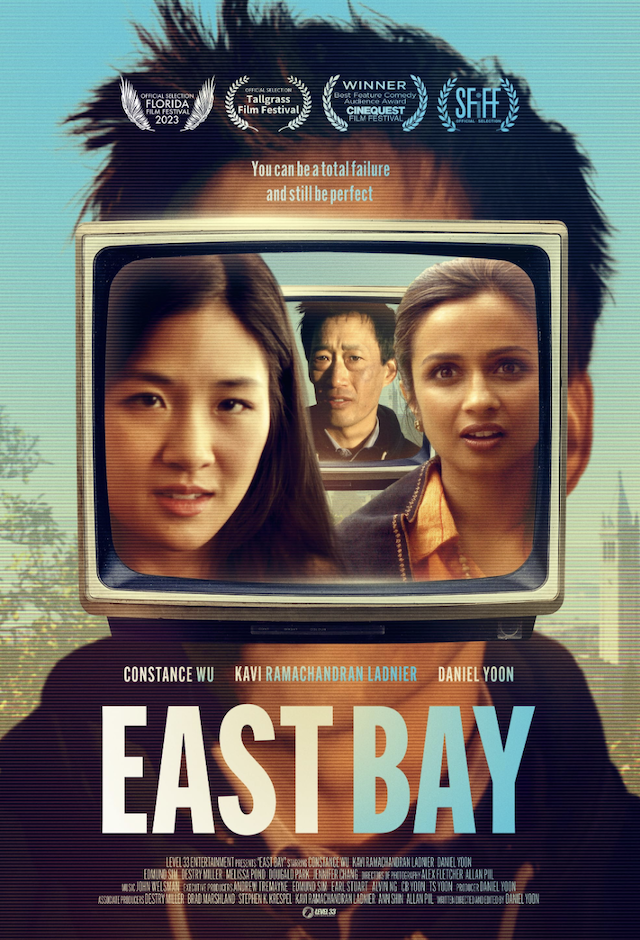
©Courtesy of Level 33 Entertainment
Exclusive Interview with Director Daniel Yoon
Q: The film is very engaging. You don’t find a distinct artist’s voice in mainstream films these days. This film doesn’t belong to any genre, yet it could fit in any genre. How did this concept come about?
Daniel Yoon: I’ve often had difficulty trying to pitch the film, normally you pitch it in terms of genre. It’s a thriller or a buddy cop movie, and this one you can’t really put into a single genre. When I started out writing it, I didn’t really think in terms of genres necessarily. I had a couple of stories, a couple of characters in mind, and I wanted to see what happened to them under certain circumstances and when they met each other. That’s how the film really started. I had certain themes in mind about what I really wanted to explore through the characters. The film ended up being what it is. If you can think of a way to put it in a genre, I would be very grateful if you could tell me something like that.
Q : The reason it was difficult to put in any genre, because it’s like a crossover film in a way. People always categorize when they present a film for distribution. It must have been difficult for you to sell this film because it doesn’t necessarily fit in any genre. So how did you pitch you this film?
Daniel Yoon: It’s been a struggle for sure. This very thing that we’re talking about has made it difficult for film festivals and made it difficult for distributors. The distributor that did pick it up though really, really liked it. We played last week in 51 theaters across North America, which is pretty impressive.
So while film festivals haven’t necessarily loved it, or at least some didn’t, some people in theaters liked it a lot. We found that audiences seem to really enjoy it. My friend said that people who liked it, really loved it. Of course, I can’t be objective about it. It’s difficult to pitch. It sounds like I’m joking but if you can think of a concise way to put it, I would love to hear it.
Q: In the film, you talk about the measurement of success. You say, for most, it’s having a family or getting married to a loved one or even having a great career or something like that. But as an artist, success is very hard to measure. As long as you have the creative juices flowing, it never stops being in the same places in a way. Has your measurement of success changed since you made this film? Talk about the measurement of success from your point of view?
Daniel Yoon: Yes. There are two questions. One, my character in the film talks about redefining success downward. Earlier in life, we have an idea of success being this really wonderful high thing where you’re the top doctor, top scientist, top movie star, or whatever. then as we go through life, maybe we don’t reach those goals.
All of a sudden, we define success as something much simpler. Maybe it’s because we have a nice job, a nice wife, and we’re not broke. Or maybe we go even lower, which is okay, we’ve had these incredibly bad, difficult circumstances in our life, and we’ve overcome them. Now, we’ve achieved some sort of peace. That’s a kind of success. However, part of the film tries to undermine the whole idea of success, of reducing the moments in our lives, as well as the whole sum of our life, into the idea of success. It’s a really weird approach to take.
When I tell that to people, it’s like, “What do you mean?” Of course, we want to be successful. How can you not want to be successful? How can you not care about success? Even if it’s not the most obvious kind of outward success — money or fame — we still want success. My character tries to question that. “Is that really all there is? Are we just the sum of our successes however, we happen to define them.”
There’s no resolution to that question really. The closest that we come to it is the mother saying that for her generation, it was the challenge just to survive. For current generations, the obligation is not just a challenge to be happy and successful. As her character says, “That is a kind of torture.” I agree. To me, part of the purpose of the film is to at least question this idea that success and reducing our life to success is not necessarily what we should want to do. We need to have a little perspective on that.
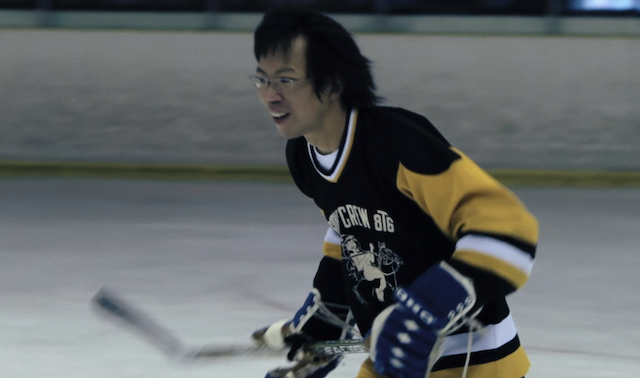
©Courtesy of Level 33 Entertainment
Q: In a nonlinear narrative film like this, you include key themes such as measuring success or defining love or what is God, to make it in a cohesive way so that it is approachable for the audience. Why did you choose a nonlinear structure for the film?
Daniel Yoon: That’s a real challenge, I think, in documentary filmmaking as well, trying to find a story, a narrative that the audience can latch on to and engage with. For something like this, that was a huge challenge. I was furious with myself for not giving the film more of a plot. Why can’t we have a plot?
There must be something he has to go and do, or he and his friends have to go do, whatever that is. They have to rob a bank, or to find someone’s killer, or they have to blow up the Death Star. Without that structure, everything is a thousand times more difficult.
I’ve tried to create a sense of story just by setting up these situations where these characters are obviously having difficulties, and we want to see how they resolve them. In addition to that, as you saw in the film, my character has a monologue at the very beginning. That’s one of several interviews throughout the film.
I tried to use those to create a structure as well, to at least give the audience a sense that these things were going to accumulate and build into something that was, hopefully, going to answer some of the questions that the characters were asking. That said, it was still a struggle having the structure of a narrative. That was a fundamental challenge in the editing.
Q: This film was the first feature for lead actress, Constance Wu. It was obviously filmed before Fresh Off the Boat or Crazy Rich Asians, that Constance Wu became a huge actor. It’s so evident when you see this film, how talented she is to begin with. talk about finding her, casting her? Back then, obviously, she was relatively unknown.
Daniel Yoon: She found us, actually. A friend of mine, Ann Shin, who’s an associate producer on this film, is a noted documentary filmmaker here in Toronto. Constance contacted Ann out of the blue and said, “Hey, I’d like to work with Asian filmmakers, specifically Asian-American filmmakers.”
Ann forwarded her information to me, and then we auditioned Constance in Los Angeles, along with several other Asian-American and Asian-Canadian actresses. Constance really stood out, for sure. It was clear she was something special.
Q: You used your real parents in this film. How much did you incorporate your real life experience with them into the film? Do you often compare and contrast the storyline to real life?
Daniel : Part of the purpose of the film was that I wanted to tell a bit of their story, through the eyes of my character and the story of his parents. They struggled with all of the same things that their characters struggle in the film. I mean, growing up under Japanese occupation. Then it’s World War II, and then the Korean War. In all of those situations, the struggle really was to survive.
And what my mother’s character says in the film, are things that she has said to me, directly. She said, life was simpler. It was hard. It was hard in a different way from now, but it was simpler. She has reiterated many times that she thought people in our generation, and younger, have it actually much harder simply because the expectation is to be happy and successful, and be seen that way publicly. That’s a much more draining and difficult task. That’s something I really wanted to include in the film.
I love both of my parents; neither of them is a professional actor, but they’re both really amazing. Actually, my father doesn’t run a convenience store. He is a retired professor emeritus in physics at the University of Toronto. He didn’t want to do it, because he doesn’t want that kind of attention.
But then he agreed, because he knew I really needed help. They looked at the script, and he said, Why does my character have to die? I said, it’s just a character. Then, when we were filming at the funeral home, he said, why are there so few people at my funeral? He really did his best and he was amazing. People actually love this character.
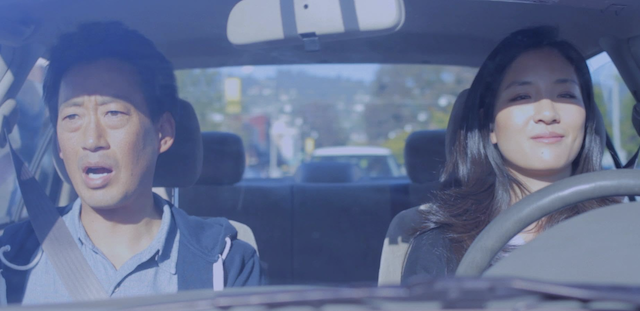
©Courtesy of Level 33 Entertainment
Q: In spite of having a small budget, you make sure to have the visual aspect of this film look so great and engaging to viewers. You talk about your visual approach?
Daniel Yoon: Thank you. The challenge for many low budget films is, or one of the challenges is production design. We can’t afford these huge, beautiful sets, we can’t afford, you know, all those things. one solution is to film outside. Another solution was to shoot in close ups. I used both of those.
We were one of the first to use a DSLR camera to shoot. We shot the film on a Canon 7D, which was a very new thing at that time, but obviously not anymore. But that allowed us to do things handheld in a simple way. But also to shoot in a beautiful place like the Bay Area. The story is set in the Bay Area, so I wanted to do it there anyway, but there’s so many beautiful places there. I happened to love it myself, and to be able to include those on film was great.
Q: Did you have any challenges shooting outside where so many things can be out of your control?
Daniel Yoon: We solved most of those things by just choosing when and where. Just not places that weren’t busy at times when they weren’t busy. There were car shots, as you notice in the film, and we couldn’t do those in a typical way because we didn’t have access to a place with a car and a green screen.
Oftentimes, you would have a car being pulled by a tow truck and as you’ll see in the car, either the camera’s inside the car or it’s on a fixed mount on the hood, it doesn’t move at all. That’s how we address some of those things. But mostly, it was just choosing places and times where we knew that there weren’t going to be many people. We shot with a very small crew, sometimes only one or two people Maximum three or four. Plus the actors. with a group that size, it’s easy to go unnoticed.
Q: Being an artist means always trying to come up with something new. But I’m curious to know, if you were influenced by films that you’ve seen or books that you’ve read? Consciously or otherwise? How did you manage to give this film a unique twist or original idea?
Daniel Yoon: That’s inevitable. It can’t help being influenced by every single thing we see, good and bad. Sometimes, in a movie that we would think of as bad, there’s elements that are really interesting, creative and amazing. We wanted to use those, either consciously or unconsciously. Then in life, the people that we meet, the situations that we’re in, the things we see on the news. That’s a very general answer so far. I know it’d be better to say something more specific. But I mean, if there is a genre to the film, it’s what they would call the lifestyle wake-up genre, where some character goes through some difficulty and tries to overcome that and they become a better person.
Although this film very much satirizes that genre, and it tries to turn it over, it tries to upend it. There are movies in that genre. A very popular one would be, say, “A Christmas Carol” by Charles Dickens. The movie based on that, where this nasty Scrooge guy goes through these horrible nightmares, and becomes a better person because he learns from all these horrible things in it. I think of the ’90s movie, “Jerry Maguire,” with Tom Cruise, where a very successful sports agent gets fired. He becomes a much better person, with much more valuable, less incessant relationships. That was very, very loosely where we started in terms of story.
In terms of tone, character and visuals, I personally like humor where it comes naturally within the scene and the characters. You can point to 100 different films of any genre where that happens. I wanted to have that be the case in this film. I love seeing films within films or art within films. Some of my favorite moments in various films are when we see someone producing art of some kind, and it’s incredibly revealing to who they are and where they are in their life. It’s beautiful, it’s funny and sad. I wanted to put as much of that as I could into this. I wrote all those short films within the film, except Don’t Touch My Bump, which was written by the noted theater writer and director Miyako Ochi in Edmonton.
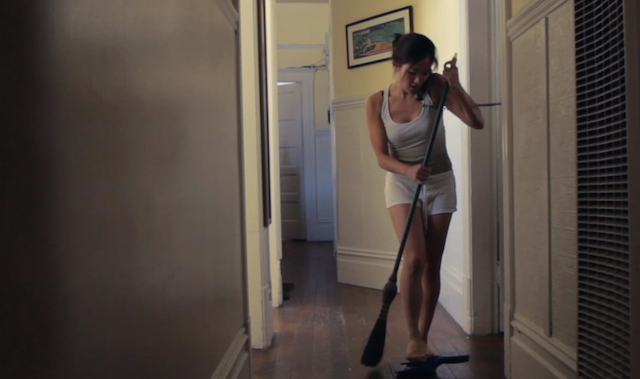
©Courtesy of Level 33 Entertainment
Q: You’ve had a pretty interesting work resume. You worked as an outward-bound instructor leading extended canoe expeditions in northern Ontario, then for an environmental cause as an energy policy analyst in Washington, D.C. and Colorado. How did you become a filmmaker? You learned a great deal about nature and the environment, How did that shift into filmmaking? Were you always doing all those things together?
Daniel Yoon: I never had any intention to go into filmmaking. Growing up in the time and place I did, people like Asian Canadians, Asian Americans, we don’t go into film. You don’t do that. There was no way that I was ever going to pursue that because there was no way I would ever get an opportunity. It didn’t even occur to me. I did a lot of painting and drawing, a ton when I was a kid. I really loved that. But, that was just something that I liked to do. It was never something that I seriously considered as a career. I actually did two undergraduate degrees at the same time.
I did an engineering physics degree and a history degree at Cornell. And then I did a master’s in public policy at Princeton because I wanted to work in the environmental field. I was very good at science and math. I thought, “OK, here’s an interesting area where you can apply math and science in a difficult and important policy area, and maybe I can help make a difference.” I found that world was particularly unproductive, at least at that time.
There’s nothing much that you could do except write these policy papers that no one was going to read anyway. I ended up working for McKinsey & Company, which is a top management consulting firm. then I still had no intention, absolutely zero, even awareness of the idea that I’d ever go into the arts. Then I was hit by a car while crossing the street as a pedestrian in California. the driver was driving on a suspended license, the car was un-insured. I had a pretty bad head injury and I couldn’t do the consulting work anymore. I sat around watching movies at home. then I just thought, why not make one?
It sounds ridiculous. But why not make one? So I made a couple of shorts and then a feature called “Post Concussion” which won some awards. That’s how it happened.
Q: How has the position of Asian people in the film industry changed from when you started your first film, “Post Concussion” and now “East Bay?” Just as Constance Wu broke out, the landscape for the Asian community in film has totally changed in the last decade. Talk about the perspective of the Asian community in the film industry now and how has it changed?
Daniel: Before I do, can I say one thing about Constance? I wish I had said earlier that she’s amazing in this film, obviously, as is Kavi Ramachandran Ladnier. [They gave] some really amazing performances. About Constance though, several people have come up to me at festivals saying that they like her more in this than anything else that they’ve seen her in. She’s very vulnerable, very sensitive and, at the same time, she’s explosive and powerful. We get to see her in a way that we don’t elsewhere. I can’t think of any other film that she’s been in where she is this interesting and powerful. I would love for her fans to be able to get a chance to see this film.
If you like the article, share your thoughts below!
Check out more of Nobuhiro’s articles.
Here’s the trailer of the film.

